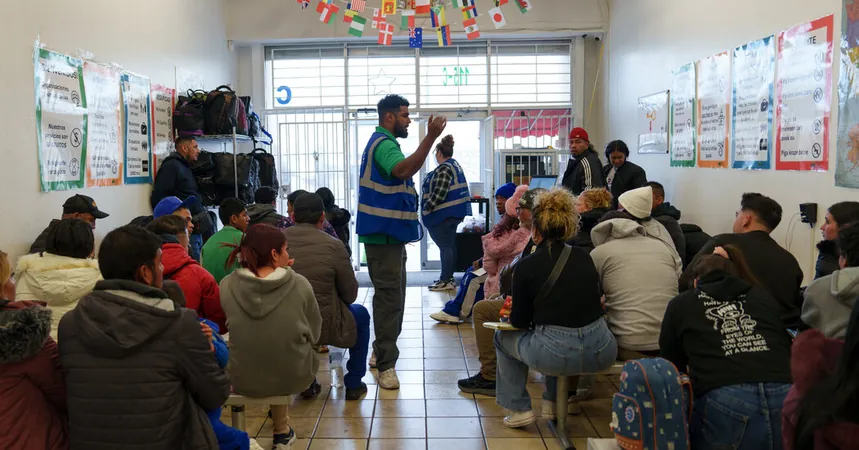
Biden's Bold Move: Extended Deportation Protections for Vulnerable Immigrants Before Trump Takes Office
2025-01-10
Author: Lok
Biden's Historic Decision
In a historic decision that could reshape the landscape of immigration policy, the Biden administration announced sweeping extensions of deportation protections for hundreds of thousands of individuals from countries facing turmoil, including Sudan, Ukraine, and Venezuela. This decisive action, taken just before President-elect Donald J. Trump assumed office, effectively complicates any immediate moves he may wish to make regarding immigration reform.
Temporary Protected Status (TPS) Expansions
Under the program known as Temporary Protected Status (TPS), affected immigrants can remain in the United States with work permits and remain shielded from deportation for an additional 18 months until at least 2026. This extension comes after Secretary of State Antony J. Blinken made recommendations for these protections based on thorough evaluations of the political and humanitarian crises in these countries.
Historical Context of TPS
For decades, both Democratic and Republican administrations have leveraged TPS to provide sanctuary for individuals from nations experiencing upheaval, with President Biden expanding eligibility amidst escalating conflicts like the war in Ukraine and ongoing strife in Venezuela and Haiti. According to Alejandro Mayorkas, Secretary of Homeland Security, the decision is rooted in a careful examination of conditions affecting immigrants and aims to balance humanitarian needs with community contributions.
Trump Administration's Impacts on TPS
Trump's previous administration saw the termination of TPS for around 400,000 individuals, particularly from El Salvador and Haiti, with claims that their home conditions had improved. However, as he prepares for a potential second term, Trump has indicated intentions to resume mass deportations, which immigrant advocates are actively pushing back against.
Legal Challenges Ahead
As reported by the Congressional Research Service, there are over a million migrants currently under TPS, and this extension strategically raises the bar for Trump's ability to revoke their protections without significant legal challenges. Immigration scholars like Steve Yale-Loehr assert that such a move by Trump would conflict with existing congressional legislation established in 1990.
Who Benefits from the Extension?
Specifically, the new order allows about 600,000 Venezuelans, 232,000 Salvadorans, and over 100,000 Ukrainians to renew their status. Additionally, around 1,900 Sudanese individuals will also benefit from the extension. The TPS program, initially instituted by President George H.W. Bush, was designed to ensure that individuals in unsafe conditions can find refuge in the U.S.
Criticism of the Extension
However, the extension has faced criticism. Incoming vice president-elect JD Vance labeled it "illegal" and plans to curtail further TPS grants. Critics argue that repeated extensions convert what was meant to be temporary support into a default long-term solution, diverging from the program’s original intent.
Ongoing Challenges in Immigration Policy
Certain challenges persist in the U.S. immigration landscape, illustrated by the persistent crises in countries like Haiti, where serious political unrest continues. If TPS were to be eliminated, hundreds of thousands would face the grim reality of becoming undocumented residents almost overnight, many having intertwined their lives with U.S. soil, including raising American-born children and sustaining jobs in crucial sectors.
Impact on Local Communities
In cities like Denver, TPS has enabled a significant influx of Venezuelan immigrants to integrate seamlessly into the workforce, bettering the local economy and enriching community life. Mayor Mike Johnston expressed support for the Biden administration’s move, emphasizing the essential roles these individuals play in various industries.
Looking Ahead: The Future of TPS
As we look ahead, the debate over TPS reflects broader issues within U.S. immigration policy—a reflection of the turbulent global climate and the urgent need for Congressional action to address the complexities of contemporary migration patterns. Can a new bipartisan agreement be reached to adapt to global realities, or will this program continue to serve as a patchwork solution? The answer remains to be seen as the nation braces for the political battles to come.


 Brasil (PT)
Brasil (PT)
 Canada (EN)
Canada (EN)
 Chile (ES)
Chile (ES)
 Česko (CS)
Česko (CS)
 대한민국 (KO)
대한민국 (KO)
 España (ES)
España (ES)
 France (FR)
France (FR)
 Hong Kong (EN)
Hong Kong (EN)
 Italia (IT)
Italia (IT)
 日本 (JA)
日本 (JA)
 Magyarország (HU)
Magyarország (HU)
 Norge (NO)
Norge (NO)
 Polska (PL)
Polska (PL)
 Schweiz (DE)
Schweiz (DE)
 Singapore (EN)
Singapore (EN)
 Sverige (SV)
Sverige (SV)
 Suomi (FI)
Suomi (FI)
 Türkiye (TR)
Türkiye (TR)
 الإمارات العربية المتحدة (AR)
الإمارات العربية المتحدة (AR)